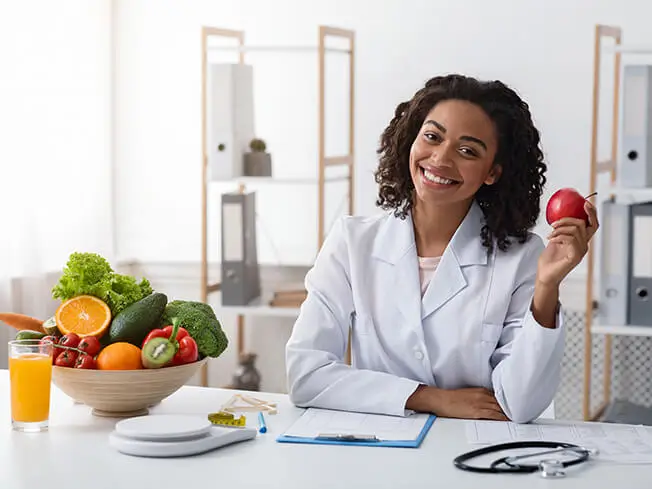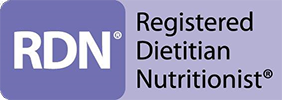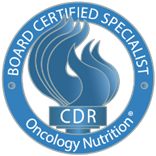Ask the Dietitian

Do you have a general question for our team of Registered Dietitian Nutritionists?
See the list of FAQs below. If you have a question that is not addressed, submit your question using the form below. We will respond and update our FAQs as questions are received.
Recently Asked Questions
When it comes to diet and wellness, the questions can be endless. Can I eat this? Should I avoid that? To help, we’ve gathered a few frequently asked questions to get you started. Our dietitians are on hand to answer any additional questions you may have.
Many people assume that cancer treatment will cause weight loss but there are many people like yourself who struggle with the opposite. Losing weight during treatment isn’t always advised and it is best to check with your doctor first.
In general, weight loss requires eating less calories and moving more than you normally do. The amount of calories can vary between different people and can be affected by activity and stress on the body. There is not one particular food or diet that is best for weight loss. If weight loss is advisable by your doctor, I would recommend that you ask for a referral to see a dietitian as that may help you find some new ideas for making changes in your diet.
Consistent findings from population studies have found that eating soy and flaxseeds are safe for all breast and hormone related cancers. The confusion came from the term “phytoestrogen”. The term refers to the chemical structure of isoflavones in soy and lignans in flaxseed that resemble estrogen in a woman’s body. Phytoestrogens are not the same things as female estrogens. Soy and flaxseeds do not contain estrogen and are safe for breast cancer patients to eat.
To read more, check out these resources:
There isn’t just one food that is good to eat but we know that it is the quality of your overall diet. Eating a plant-based diet has been shown to reduce the risk of breast cancer coming back. A plant-based diet is a diet made up of mostly fruits, vegetables, and grains. It can include meat, but in smaller amounts. In addition to eating a healthy diet, limit alcohol in the diet as much as possible.
To learn more about a plant-based diet, check out these resources:
| Steaks | 145° F and rest for 3 minutes |
| Seafood | 145° F |
For more information for food safety during cancer treatment, check out this resource:
The simple answer is that there are no studies in people that have shown reducing sugar intake prevents or treats cancer. Research also has not shown that eating too much sugar causes cancer or increases tumor growth.
The issue is more complicated though because every cell in our body, including cancer cells, uses sugar from our bloodstream for fuel. Those sugars come from foods in our diet that contain carbohydrates, including healthy foods like fruits, vegetables, and whole grains. This can make the simple statement that sugar feeds cancer true but not the full story.
There is however an indirect relationship between sugar and cancer risk. Eating high-sugar foods like cakes, cookies, sodas, and candy can lead to excess calories in the diet which can increase excess body fat. Excess body fat is a risk factor for several different cancers.
To read more, check out these resources:
- AICR.org The Sugar and Cancer Connection
- Cancer.net Does Sugar Cause Cancer?
Here are a few resources for ideas for preparing whole grains:
- Whole Grains Council – How to Cook , Video Recipes
- Kitchn Has great how-to cook videos. Just search for the particular grain. Here is an example for Farro: https://www.thekitchn.com/farro-recipe-23110148 . Farro is one of my favorites. You are right brown rice can be tricky.
- Follow our Facebook Page as every other month our dietitians offer cooking demos.
Hot flashes are an uncomfortable feeling that can be a side effect of some breast cancer treatments. Although many foods are promoted on the internet as being helpful to prevent hot flashes, most have little research to support the claims. There is no evidence that eating rhubarb will decrease hot flashes, but try avoiding triggers such as:
- Caffeinated drinks like tea and coffee
- Alcoholic drinks
- Spicy foods
- Hot drinks
Other triggers are smoking, stress, and extreme heat. Focus on ways to reduce triggers like reducing stress with yoga or meditation, wearing lightweight cotton clothes, and using a fan. Staying well-hydrated can also help.
Dietary supplements have not been proven useful for treatment of hot flashes. Some can also interact with your cancer treatments and have unwanted side effects. Talk to your doctor before taking any dietary supplements.
The questions answered by dietitians on FLCancer.com should not replace consultation with a healthcare professional. The content is for informational purposes only. Nothing contained in this site is or should be considered, or used as a substitute for, medical advice, diagnosis or treatment.


